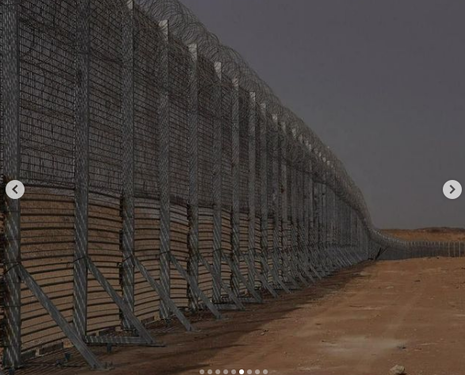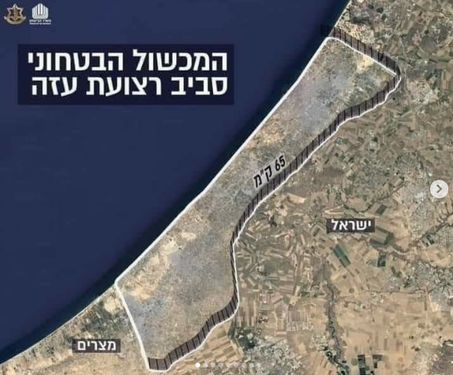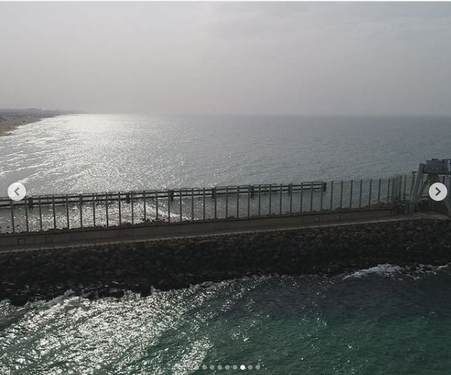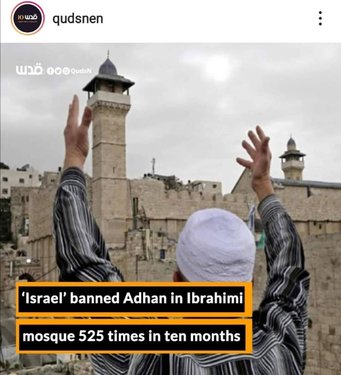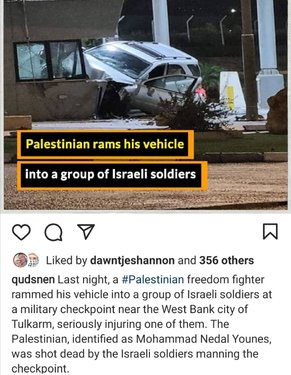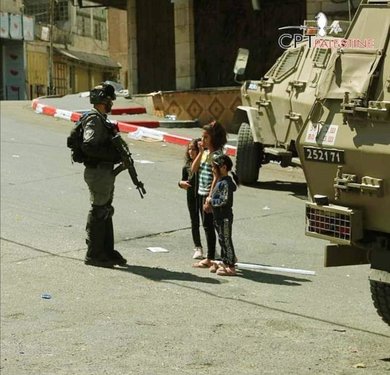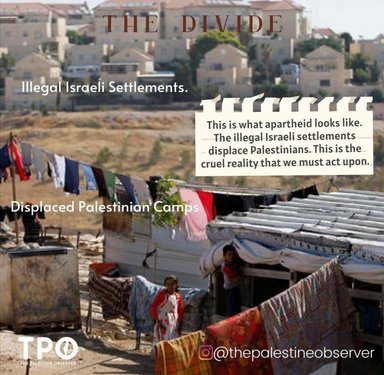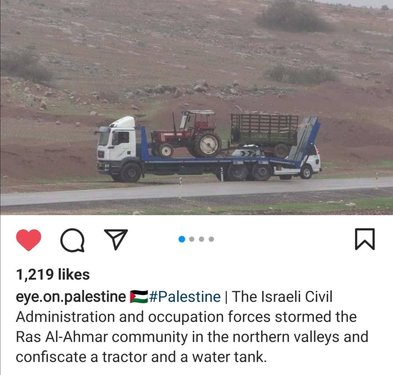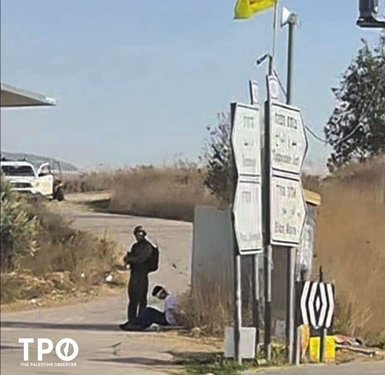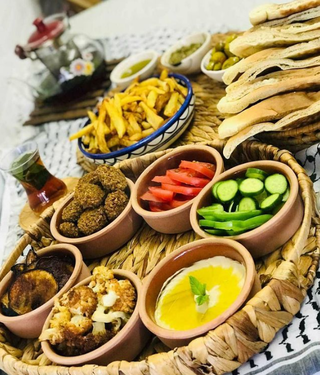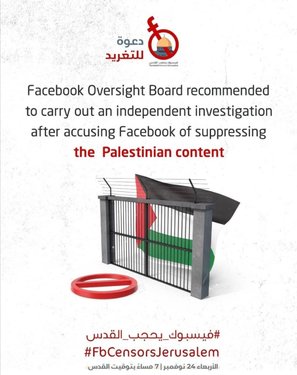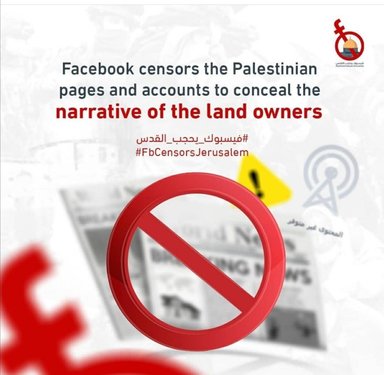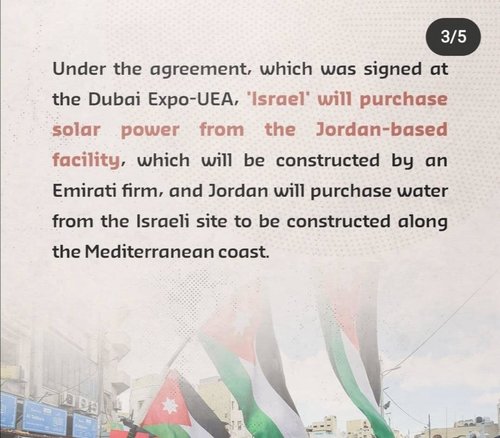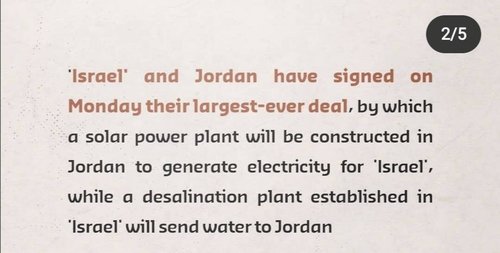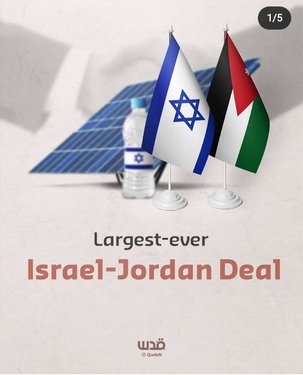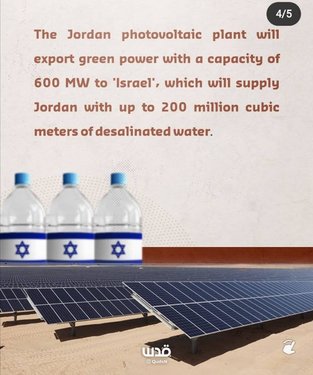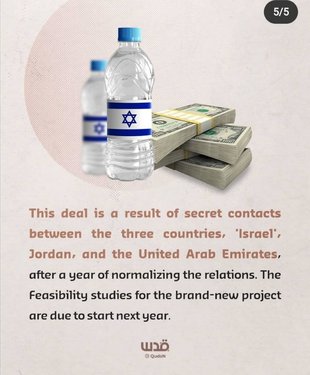-
Posts
8,466 -
Joined
-
Days Won
773
Content Type
Profiles
Forums
Events
Everything posted by ummtaalib
-
The First Intifada 1987-1993 It was a normal day until a settler stormed through the crowds of Palestinian workers, ending the lives of four of them and setting stage for an uprising.34 years since the incident that sparked 6 years of Intifada. It lasted for 6 years and ended with the announcement of the Oslo Accords in 1993
-
Occupied Jerusalem - Qastal: Today marks the 34th anniversary of the Palestinian Stone Intifada, which erupted from the Gaza Strip after a settler ran over a group of Palestinian workers from Jabalia camp near the Beit Hanoun checkpoint, spreading the flames of the popular uprising in Palestine over its entire historical area.The “Intifada of the Stones” is considered the largest public gift that the Palestinian people are waging after the Zionist gangs occupied Palestine in 1948, which restored consideration to the Palestinian cause after it had been forgotten over the years, and its strategic weapon, the “Stone”.The spark of the “intifada of stones” erupted after the funeral of the Palestinians that day, 4 workers from the town of Jabalia in the northern Gaza Strip.Demonstrations swept the town of Jabalia and its camp, during which thousands of young men threw stones and empty and burning bottles at the occupation soldiers.It extended to every street and alley in the camp, where the occupation soldiers confronted them with live bullets, and the young man, Hatem Al-Sisi (21 years), was martyred as a result; The first martyr in this uprising.At the time, the occupation believed that these confrontations were a transient response to the crime of the trailer accident, and that things would calm down the next day, but they flared up again and escalated until they spread to the rest of the Gaza Strip camps and the neighborhoods of Gaza City and then the West Bank.The word “uprising” entered the Arabic dictionary and the dictionaries of other languages in terms of its translation, causing events to become a sensation in the media, especially in the Western media, despite the occupation’s attempt to obscure it.With the acceleration of events, the Intifada took on a popular character, unity of position, social solidarity, family solidarity, comprehensiveness of confrontation, and widening of the arena of direct confrontation with the occupation in all cities and villages of Palestine. جويرية يلدز (@juveriayildiz) • Instagram photos and videos
-
Gaza Strip encircled by Wall The Israeli occupation celebrates the completion of the construction of the wall surrounding Gaza, and the transformation of the besieged Gaza for 16 years into a prison where more than two million Palestinians live. Gaza NOw in English (@gazanowen) • Instagram photos and videos This is how the Israeli occupation transformed the besieged Gaza after it finished building the wall today.Gaza has become the largest prison in the world by air, sea and land. The Israeli occupation has finished encircling Gaza Strip with a fence hundreds of meters above the ground, and extending to tens of meters underground, in addition to many very precise monitoring devices that monitor the movement of people step by step.Look closely at the picture, this is happening in the twenty-first century, "Israel", under the full watch and hearing of the whole world, puts more than two million people inside an iron cage in every sense of the word, and the world and the international community are still calling what is happening in Palestine a "conflict". Via @osama_naim9
-
Zi-o-ni-st Atrocities Israeli police officers were caught on camera planting a gun in a Bedouin man’s car after pulling him over for using his phone while driving. The man spent more than a month in detention prior to being released on Sunday after a video, where a police officer can be visibly seen planting the firearm, came to light. By @trtworld www.instagram.com/p/CXMc6tEFNR7/ Israeli occupation forces dismantled #Palestinian-owned agricultural and residential facilities in the village of Nahalin, south of the occupied West Bank. The IOF aggressively assaulted Nahalin's people who protested against the destruction of their facilities. www.instagram.com/p/CXLYOuhAE4S/ Israeli occupation forces sabotaged large amounts of vegetable crops belonging to Palestinian farmers in the town of Anata, northeast of occupied #Jerusalem, today. www.instagram.com/p/CXMKPn9gezo/
-

Saudi Declaration: Tableeghi Jamaat & Terrorism
ummtaalib replied to ColonelHardstone's topic in General Islamic Discussions
Innaa lillaahi wa'innaa ilayhi raaji'oon! -
Q. What is the etiquette of visiting a sick person? (Question published as received) A. The etiquette of visiting the sick is based on giving comfort and hope to the sick person. This is the basic principle by which all etiquette may be evaluated. Any act that would bring comfort and give hope to the sick would be encouraged. Any act that would give the opposite effect should be abstained from. Hence, if the sick person is sleeping, they should not be disturbed unless seeing the visitor would make them happy. A person’s stay should not be so long that would inconvenience the sick person. Offer words of hope and comfort to the sick person and do not say anything negative in their presence. Learn the Duas for visiting the sick and recite them in the presence of the sick person. After visiting the sick person, take leave. Do not expect to be entertained at the home of the sick person unless you are sure the hosts would want you to stay. And Allah Ta’ala Knows Best Mufti Ismaeel Bassa Mufti Moosa Salie (The answer hereby given is specifically based on the question asked and should be read together with the question asked. Islamic rulings on this Q&A newsletter are answered in accordance to the Hanafi Fiqh unless otherwise stated.) Fatwa Department
-
-
Kuwait prohibits Israeli trade ships According to Kuwaiti newspaper Al Anba, Kuwaiti Public Works Minister Dr. Rana Abdullah Al-Fares issued on Saturday an order prohibiting the entry of any commercial ships to and from 'Israel' into Kuwaiti territorial waters. Under Kuwiati law it is illegal to import, exchange or possess any Israeli goods, commodities or products whether received directly or indirectly. www.instagram.com/p/CXHUnYgsxbB/
-
When there are heavy winds together with intense darkness, one should recite Surah Falaq and Surah Naas. عن عقبة بن عامر، قال: بينا أنا أسير مع رسول الله صلى الله عليه وسلم بين الجحفة، والأبواء، إذ غشيتنا ريح، وظلمة شديدة، فجعل رسول الله صلى الله عليه وسلم يتعوذ بأعوذ برب الفلق، وأعوذ برب الناس، ويقول: يا عقبة، تعوذ بهما فما تعوذ متعوذ بمثلهما (سنن أبي داود، الرقم: 1463) Hazrat Uqbah ibn Aamir (radhiyallahu ‘anhu) reports: “While I was travelling with Rasulullah (sallallahu ‘alaihi wasallam) between Juhfah and Abwa, a strong wind and intense darkness enveloped us. Rasulullah (sallallahu ‘alaihi wasallam) began to seek refuge with Allah Ta’ala by reciting Surah Falaq and Surah Naas. He then said, ‘Uqbah, seek refuge with Allah Ta’ala through these two Surahs for none can seek refuge with anything like these two Surahs.’” ihyauddeen.co.za
-
- 1
-

-
Horrendous scene! A young boy detained, handcuffed and blidfolded! The Israeli occupation forces detained a Palestinian child near the illegal settlement of Yetzahar, southern Nablus. Eye On Palestine (@eye.on.palestine) • Instagram photos and videos
-
Continuing violence by zionist soldiers... The Israeli occupation police attack the fans of Sakhnin football team, a Palestinian team in the 1948-occupied Palestinian territories, while they celebrating the victory of their team in Sakhnin city, today. www.instagram.com/p/CW6mzmulGjv/ The Israeli Civil Administration and occupation forces stormed the Ras Al-Ahmar community in the northern valleys and confiscate the properties and vehicles of the residents. www.instagram.com/p/CW7iZ7ct42m/ The Israeli occupation authorities razing a land in Jabal Al Mukabbir town in Jerusalem. www.instagram.com/p/CW7rTJ5lMqK/ Clashes broke out between Palestinian youth and the Israeli occupation forces that stormed Al Berih city, shortly before. www.instagram.com/p/CW6ql8ilqJm/ The Israeli occupation forces detain the boy Wisam Salaymah at " 160 Checkpoint " in Hebron after 3 hours of holding him at the Checkpoint. www.instagram.com/p/CW6ZR2yFRS_/ (the child was handcuffed and blindfolded, just sitting there with head down and fully armed soldier standing over him! inhumane and violent people!)
-
Palestinian writer and activist Mohammed El-Kurd delivered a speech at the UN on Monday, blasting the "Israeli settler-colonial regime" for its occupation of Jerusalem "Thank you for these groundbreaking speeches," came the acerbic start to El-Kurd's address. "I'm sure the occupation authorities are really concerned right now." Speaking on the United Nations on the International Day of Solidarity with the Palestinian People, El-Kurd described the day Israeli settlers took half of his home in Sheikh Jarrah, Jerusalem. He was 11 years old at the time. He said that the Israeli settlement expansion has not only affected his home village of Sheikh Jarrah but also daily life in Silwan, Eissawiya, and Masafer Yatta in the occupied city of Hebron. "The UN has called this a war crime but I know this is theft," he explained. "The battle over Sheikh Jarrah is not legal in its essence, it is political. It is part of the larger systematic essence to Israelise the entirety of Jerusalem, my native city. My family and my neighbours understand this, we know first hand that the Israeli judicial system is created by those who benefit endlessly from the Israeli settler-colonial regime." Israelise is a term used to describe the erasure of indigenous Palestinian heritage and populations by Israel. He spoke of how little faith Palestinians have in the justice system in the occupied territories, which he says is designed to protect Israeli settlers. "As I speak to you, our lawyer is trying to convince a settler judge to rule against settlements. The word apartheid comes to mind, but saying there is an asymmetry in justice in the Israeli judicial system is an understatement. What we have on our hands is a colonialist ideologically driven system built by and for colonisers." With their fearless and unfiltered words, Mohammed El-Kurd and his sister Muna have been credited with catalysing global uproar over Israel's violations of Palestinian rights, including expulsions in Sheikh Jarrah and the deadly Israeli aerial assault on Gaza earlier this year. But after a summer of global solidarity, El-Kurd said his Jerusalemite community can feel the world return to its silence. "This summer we took our struggle to the streets our efforts to resist this takeover were joined by Palestinians across Jerusalem and the world and what became known as the unity uprising. The situation rapidly escalated into attacks on besieged." "The reality for Palestinians however has not changed. Our neighbourhood was put under a blockade for three months maintained by Israeli forces with continuing restrictions intended to suffocate the lives of the hundreds of Palestinians who lived there, and yet meanwhile armed Jewish settlers who have already occupied some of our homes roam freely on the streets no questions asked." "On any given night, a dozen gun-wielding fanatics patrol my street with arrogant impunity. They are protected, even supported by the troops blockading our community," El-Kurd said. He went on to say the root cause for the suffering in Jerusalem goes beyond land and judiciary and roots in Israeli settler colonialism. "The reality that Palestinians across 70 years of zionist rule have experienced this vocabulary is not theoretical. It is evident in the attempts to throw us out of our homes so that settlers can occupy them with the backing of the regime whose forces and policies provide violent support for the transfer of one population to install another," he said. "I do not care whom this terminology offends." El-Kurd extended his solidarity to Palestinians in the besieged Gaza Strip which is suffering huge shortages of basic goods due to over a decade of a crippling siege by Israel. He also acknowledged Palestinian prisoners in Israeli jails, including his neighbour Murad, "an elementary school teacher who was robbed from his family and put into prison, slapped with trumped-up and fabricated charges only because he dared say no to ethnic cleansing". UN Secretary-General Antonio Guterres warned on Monday the situation in the region "continues to pose a significant challenge to international peace and security". The "persistent violations of the rights of Palestinians, along with the expansion of Israeli settlements, risk eroding the prospect of a two-state solution", he said. Source
-
Candle of Jewish Hanukkah lit at Ibrahimi Mosque According to local sources, Israeli President Isaac Herzog stormed the Ibrahimi Mosque in the occupied West Bank city of Hebron and lighted the candle of Hanukkah. Meanwhile, Israeli War Minister, Benny Gantz, lighted the candle of Hanukkah at al-Buraq Wall in occupied www.instagram.com/p/CW0_cImsQTt/
-
A traditional Palestinian breakfast Eye On Palestine (@eye.on.palestine) • Instagram photos and videos This is humus (garbanzo beans smashed mixed with sesame purée,lemon juice and olive oil on top. Next is fried cauliflower and next fried sliced eggplants and the rest you should know. If you have a chance try it with pocket bread (hbazzi7359aolcom)
-
By Shaykhul-Hadīth, Hadrat Mawlānā Muhammad Saleem Dhorat hafizahullāh Every capability and strength in the human body has limitations. For example, the human capability of seeing is limited; one may be able to see someone walking at a distance of 100 metres, but as the person walks further away, it will become increasingly difficult to see him. After travelling a certain distance, the person will completely disappear from sight. The human capability of hearing is also limited; one is able to hear a person speaking from a close distance, but is unable to hear a person speaking from a far distance. Similarly, every strength and capability granted to us by Allāh ta‘ālā has limitations. The intellect is also one of these limited capabilities granted to us by Allāh ta‘ālā. There are many things which the human intellect cannot perceive as it has boundaries beyond which it cannot function. Therefore, just as we do not expect to be able to see everything with our eyes or hear every sound with our ears, we should not expect to be able to understand everything with our intellects. The Three Sources of Knowledge There are three sources of knowledge: 1. The first source of knowledge is the five senses. We use our five senses (i.e. eyesight, hearing, taste, smell and touch) to perceive different things. For example, when we touch a surface, we learn that it is smooth or rough. When we taste a fruit, we gain knowledge of whether it is sweet or sour etc. 2. The second source of knowledge is the intellect. If used within its limits, the intellect is a great blessing of Allāh ta‘ālā. By using the intellect to ponder upon the creation, one can attain the recognition of the Creator. This alone shows how great of a blessing the intellect is. Allāh ta‘ālā states in the Glorious Qur’ān, From the five senses, we most often use the senses of seeing and hearing, thus Allāh ta‘ālā sufficed on mentioning only these two when referring to the five senses. Thereafter, He mentioned the heart with which we think and understand. Thus, in this verse, Allāh ta‘ālā states that He granted us senses and intellect, through which we can acquire knowledge. 3. The third source of knowledge is wahy (Divine Revelation). Allāh ta‘ālā revealed wahy upon the Prophets ‘alayhimus salām and they conveyed the knowledge of wahy to their nations. Limitations of the Intellect From the three sources of knowledge, the five senses and intellect have limitations: 1. The five senses cannot perceive what the intellect is able to perceive. For example, the intellect can perceive that there is oxygen in a room but the five senses cannot. Intellect tells us that a human cannot survive without oxygen; therefore, the fact that people in that room are alive certainly means that oxygen is present in the room. Now, if a person refuses to believe that oxygen exists in the room because of not being able to perceive oxygen with his five senses, then we would all deem him to be irrational. We would explain that he will only be able to come to the correct understanding by applying his intellect, as the five senses have their limitations and cannot perceive what the intellect is able to perceive. 2. Similarly, the intellect cannot perceive what wahy is able to perceive. Just as the five senses fail to grasp what the intellect can grasp, the intellect fails to grasp what wahy can grasp. Therefore, just as we accept the limitations of the five senses, we also need to accept the limitations of the intellect. Hakīmul-Ummah, Mawlānā Ashraf ‘Alī Thānwī rahimahullāh very beautifully explains the limitations of intellect. He says, ‘…Like other senses the perceptions of intellect have limits. Beyond these limits, wahy is needed. The example of this is that if a person (mounted on a horse) desires to climb a mountain, the horse will only be able to go till the bottom of the mountain. To climb the mountain, one will have to go himself. Similarly, the feeble intellect is incapable of climbing the mountain (which can only be climbed by wahy)…’ Do Not be Self-Opinionated After recognising the limited nature of the intellect, we can understand how a person will be prone to making mistakes if he was to apply his intellect beyond its boundaries. We can also better understand the dangers of the norm today, where each person has taken his own intellect as the sole authority in deciding what is right and wrong. This attitude is a sign that one has too much reliance on his own opinions, a quality regarding which Nabī sallallāhu ‘alayhi wasallam warned the Ummah. Rasūlullāh sallallāhu ‘alayhi wasallam said, Sayyidunā ‘Umar radhiyallāhu ‘anhu said, There are many Islamic beliefs and teachings which we cannot comprehend with our intellects, yet we still have conviction in their truthfulness solely because Allāh ta‘ālā has revealed them in the Glorious Qur’ān or through His Messenger. For example, we believe in the existence of Jannah and Jahannam and in the life Hereafter despite not being able to comprehend them. We wholeheartedly accept these because they have been sourced from wahy which is beyond the perception of our intellects. In fact, attempting to understand such beliefs with the intellect will lead one astray. It was due to applying the intellect beyond its limits that many individuals and sects rejected the truth and deviated from the straight path. Do Not Follow Mere Speculations One incorrect use of the intellect is to jump to conclusions by following whatever comes to mind, especially when it comes to the matter of religion. By doing so, one is basing his religion on mere speculation. Allāh ta‘ālā states regarding those who disbelieve in the Hereafter, Conclusion We must understand that our duty as Muslims is to submit wholeheartedly to the beliefs and teachings of Islām, whether our intellects are able to comprehend or not. This can only be done when one acknowledges the limitations of the intellect, thus accepting the knowledge received through wahy. We should be confident in this regard and should avoid attempting to justify all the injunctions of Dīn through the intellect. May Allāh ta‘ālā grant us the ability to totally submit our intellects to wahy and grant us steadfastness on Dīn. Āmīn. Extracted from Riyādul Jannah, Vol. 29 No. 9, 2020 © Riyādul Jannah
-
Rasulullah Sallallahu Alayhi Wa Sallam said: “The best of Muslims is he from whose hand and tongue, other Muslims are safe.” (Muslim) “The best of people are those with the most excellent character.” (Tabarâni) “The best prayers for women are those performed in the most secluded parts of their houses.” (Ibn Khuzaymah) “The best of you are those who feed others and return greetings.” (Abu Ya’lâ) “The best of that which you treat yourself with is cupping.” (Hâkim) “The best of days that you should perform cupping are the 17th, 19th and 21st of the month. I did not pass a single gathering of angels on the night of Isrâ’ except that they would say to me, ‘O Muhammad, perform cupping!’” (Ahmad) “The most beloved of deeds according to Allah are the continuous ones, even if they are little.” (Bukhari) “The most beloved words according to Allah the Most High are four: Subhânallah, Alhamdulillâh, Lâ ilâhaillallah and Allahu Akbar.” (Muslim) “The best of provision is that which suffices a person.” (Ahmad) “The most beloved word according to me is that which is most truthful.” (Bukhâri) “The best word of remembrance is: Lâ ilâha illallah and the best supplication is: Alhamdulillâh.” (Tirmidhî) “The best of charity is that which is given to the relative that harbours enmity against you.” (Ahmad) “The best prayer is that with the longest (Qiyaam) standing.” (Muslim) “The best of all worship is supplication (dua).” (Hâkim) Rasulullah Sallallahu Alayhi Wa Sallam was asked: “Which of the believers are the most intelligent?” He replied, “Those who remember death the most and are best prepared for what comes after it. They are the intelligent ones.” (Tabraani) Jamiatul Ulama (KZN) Council of Muslim Theologians
-
- 1
-

-
VIOLENCE by Israhel-lis in capital letters The Israeli occupation police stormed the well-known Palestinian restaurant of " The Old Man and the Sea " in the occupied city of Jaffa, assaulted the workers and closed it for 30 days.Eye On Palestine (@eye.on.palestine) • Instagram photos and videos The Israeli occupation forces brutally assaulting Palestinian young men in Silwan village, this morning. www.instagram.com/p/CWtDzoEliAu/
-
Belgium moving forward Belgium’s foreign office has announced on Wednesday that it will label all products produced in West Bank Israeli settlements, considered illegal under international law. Israel slammed Belgian's decision and canceled meetings with the Belgian Foreign Ministry and the country's parliament. www.instagram.com/p/CWtsLJPNgoX/
-
-
Q. Party A wishes to marry Party B. However, they reside in different countries. If they have a virtual Nikah over video call will this be valid? (Question published as received) A. It is a condition for the Nikah to be valid that both parties and/or their representatives, as well as the witnesses, be present at the meeting in which the Nikah is officiated. Hence, at the place where the Nikah is being conducted, representation from both parties must be present. If only one party is present and the other party is participating in the proceedings over a video call, this will not fulfil the requirement for a valid Nikah. It should be noted that the absent party can appoint a representative to represent them at the Nikah meeting. This will fulfil the requirement for the Nikah to be valid. (Shaami Vol. 3 pg. 21) And Allah Ta’ala Knows Best Mufti Ismaeel Bassa Mufti Moosa Salie (The answer hereby given is specifically based on the question asked and should be read together with the question asked. Islamic rulings on this Q&A newsletter are answered in accordance to the Hanafi Fiqh unless otherwise stated.) Fatwa Department Jamiatul Ulama (KZN)
-
Jordan-Israhell deal Yesterday: #Israel, #Jordan and the #UAE are expected to sign a deal today in Dubai under which a solar plant in the Jordanian desert will generate power for Israel, in exchange for a desalination plant in Israel that will provide Jordan with water www.instagram.com/p/CWoS99OK3vg/ Jordan University students chanted for Palestine in rejection of the brand new Israel-Jordan deal, through which a solar power plant will be constructed in Jordan to generate electricity for 'Israel', while a desalination plant established in 'Israel' will send water to Jordan. www.instagram.com/p/CWoIjDnFXwv/ (Traitors to their own!)

